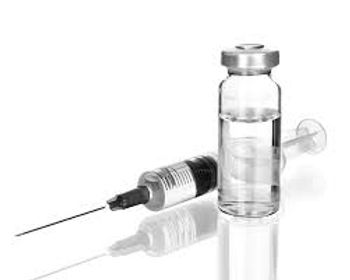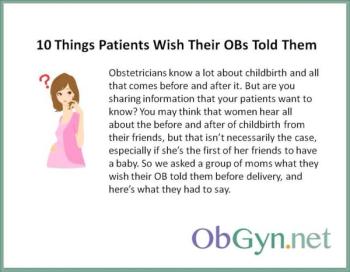
Dr. Afshar talks about the onslaught of information that the modern-day doctor faces and how to keep the focus on the patient.

Dr. Afshar talks about the onslaught of information that the modern-day doctor faces and how to keep the focus on the patient.

Will cell-free DNA testing replace amniocentesis?

“Dosing of oxytocin and timing of level of increase in dose has been the subject of many scientific publications,” noted study coauthor and Contemporary OB/GYN editorial board member Haywood Brown, MD.

The ACP’s Clinical Guideline advising against pelvic examinations for the detection of pathological conditions in asymptomatic, nonpregnant, adult women is unfounded, ill timed, and ill considered.

Clinicians routinely encounter patients with bacterial vaginosis and candidiasis. Here’s how to differentiate and treat these bothersome conditions.

For surgeons who use fascial closure devices, neoClose occupies a place of its own at the head of the class.

Vulvovaginal disorders in prepubertal girls-including vulvovaginitis, lichen sclerosus, labial adhesions, urethral prolapse, and genital ulcers-are common and can be managed on an outpatient basis by a skilled clinician.

Readers respond to ‘Euploid single embryo transfer: The new IVF paradigm’

Unless there is definitive evidence that one defendant is solely responsible, once jurors see “dueling defendants” they most often assume the worst happened and find blame all around.

The optimal time to get the HPV vaccine is before a first sexual encounter. But getting the vaccine after still offers significant protection against cervical dysplasia.

A recent Centers for Disease Control and Prevention (CDC) study of data from a single state suggests that there may be a connection between use of hormonal contraceptives prior to pregnancy and increased risk of developing gestational diabetes (GDM).

Rates of human papillomavirus (HPV) vaccination in adolescents remain low, 8 years after the Advisory Committee on Immunization Practices (ACIP) recommended routine use of the vaccine in girls aged 11 to 12 years, according to a recent report in the Centers for Disease Control’s (CDC) Morbidity and Mortality Weekly Report.

An analysis of minimally invasive hysterectomies performed at multiple institutions over a 7-year period shows that one in every 368 women who underwent morcellation had uterine cancer. According to the investigators, the study also reveals an association between advanced age and increasing prevalence of underlying cancer and endometrial hyperplasia in these patients.

As a specialty, Ob/Gyn seems immune to the so-called “July Phenomenon. But are your patients safe from the errors that eager first-years of other specialties may make?

The morcellation controversy heats up as physicians all over the world who use Ethicon power morcellators are being asked to return the medical devices.

If someone is watching, clinicians will wash their hands. But what happens when big brother isn’t there?

Good news: Use of antidepressants in early pregnancy is not to blame for fetal cardiac malformations, should one occur.

The bacteria profile of the bladders of women with urgency urinary incontinence may help with future prevention, diagnosis, and treatment options.

Obstetricians: Want to know what your patients wish you had told them before delivery? We surveyed a group of moms and are sharing the top 10 responses.

According to a new study in Stroke, women who were sexually abused during childhood may be more likely to have higher intima media thickness, suggesting that stressors in early life may have an impact on cardiovascular disease (CVD) later in life.

A new analysis of data from participants in the Women’s Health Initiative (WHI) suggests that regular use of some nonsteroidal anti-inflammatory drugs (NSAIDs) may modestly increase cardiovascular risk in women. The findings were published in Circulation.

Women who have a history of pregnancy loss, either miscarriage or stillbirth, may be at greater risk of postmenopausal cardiovascular disease (CVD), according to a recent study in The Annals of Family Medicine.

Midwifery and obstetrics don’t need to be mutually exclusive disciplines. Here are 6 examples of how midwives and OBs can give complementary care that benefits patients.

Letrozole, a breast cancer drug, was compared with clomiphene as a fertility treatment for women with polycystic ovary syndrome. Find out which drug performed best.

Studies with poor methodology were the basis of giving prophylactic antibiotics to women in labor who are positive for group B Streptococcus, an analysis finds.

Maternal inflammation during pregnancy may be linked to a risk of schizophrenia in the woman’s offspring, according to a new study in The American Journal of Psychiatry based on analysis of data from a large Finnish cohort.

A study in The New England Journal of Medicine funded by the Eunice Kennedy Shriver National Institute of Child Health and Human Development suggests that letrozole may be more effective at helping women with polycystic ovary syndrome (PCOS) become pregnant than clomiphene.

New research by microbiologists at Loyola University suggests that the urinary microbiome in women with urgency urinary incontinence (UUI) may differ from that in women without the condition, which has implications for management of the disease.

A novel birth control option is in the works, and it’s in the form of a microchip that, when implanted, could work for up to 16 years. The future is now, folks.

New recommendations against routine pelvic exams in adult women with no symptoms have been issued by the American College of Physicians. What do you think?